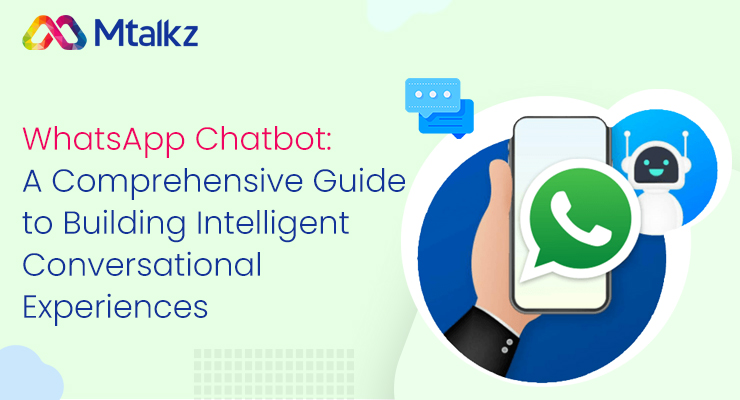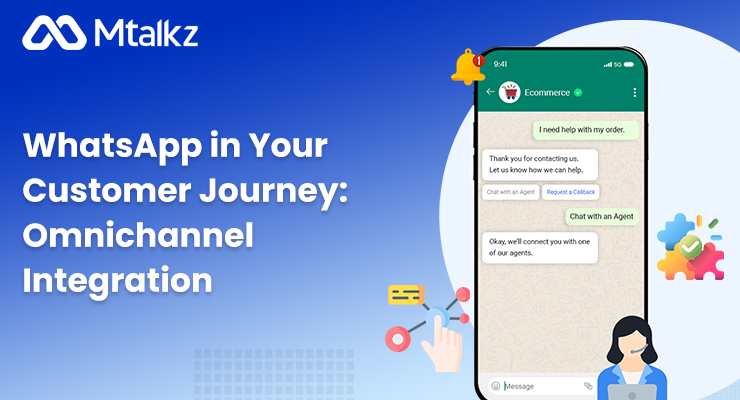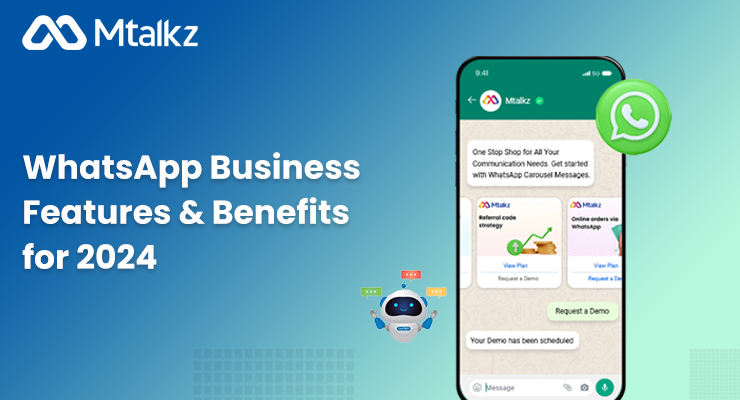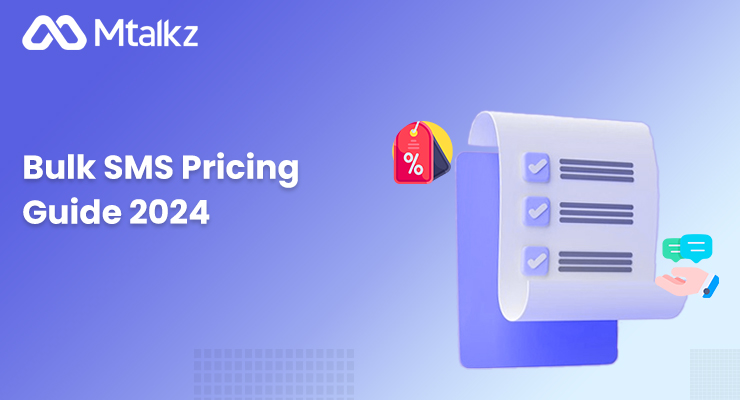WhatsApp Chatbot Definition
A WhatsApp chatbot is a sophisticated automated software system designed to operate within the WhatsApp platform, utilizing either rule-based mechanisms or artificial intelligence (AI). Functioning as a virtual conversational agent, a WhatsApp chatbot facilitates interaction with users through the chat interface, imitating a human-like conversation.
This innovative tool is employed to address a variety of purposes, including responding to customer inquiries about products and services, disseminating content, boosting sales, and delivering timely notifications related to orders, payments, and shipping.
Leveraging the capabilities of the WhatsApp Business API, these AI chatbots demonstrate the ability to intelligently engage with diverse user groups, effectively navigating and responding to queries and requests without requiring human intervention.
Through its dynamic features, a WhatsApp chatbot serves as a versatile solution for businesses and organizations seeking efficient and interactive communication channels on the popular messaging platform.
Explore how you can leverage the power of WhatsApp Chatbots – Talk to our Experts
Significance of WhatsApp Chatbot in Modern Communication
WhatsApp chatbots are vital for modern businesses, providing a 24/7 accessible and efficient communication channel. They enable real-time interactions, automate routine tasks, and personalize customer experiences.
With multifunctional capabilities, businesses can use chatbots on WhatsApp for tasks ranging from answering FAQs to engaging in interactive marketing. The data collected aids in understanding customer preferences, contributing to informed decision-making.
Cost-effective and scalable, WhatsApp chatbots adapt to various industries, freeing up human resources and enhancing overall customer satisfaction. These chatbots play a pivotal role in streamlining operations, fostering customer loyalty, and contributing to the success of businesses in diverse sectors.
Features and Capabilities of WhatsApp Chatbots
WhatsApp chatbots have become increasingly popular for businesses as they offer a range of features and capabilities that enhance customer engagement and streamline communication. Here’s a breakdown of some key features:
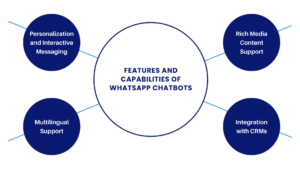
Personalization and Interactive Messaging
WhatsApp chatbots provide a personalized experience by enabling interactive messaging, allowing you to create dynamic conversations with your audience. This goes beyond simple one-way communication, as your audience can interact with the bot by providing input, making choices, and receiving personalized responses.
Rich Media Content Support
WhatsApp chatbots support rich media content, including images, videos, and documents. This capability allows your business to share product catalogs, promotional videos, brochures, and other visually engaging content directly within the chat interface, enhancing the overall user experience.
Multilingual Support
WhatsApp chatbots can be designed to support multiple languages, enabling you to reach a global audience. This feature is particularly beneficial for businesses that are targeting diverse demographics, allowing them to provide customer support and information in the user’s preferred language.
Integration with CRMs
Integration with Customer Relationship Management (CRM) systems is a crucial feature for businesses. WhatsApp chatbots can be connected to CRMs to sync customer data, conversation history, and other relevant information. This integration streamlines customer interactions, ensuring that businesses have a comprehensive view of customer interactions and journeys across various channels.
WhatsApp chatbots for businesses offer a comprehensive set of features that contribute to enhanced customer engagement, streamlined communication, and improved overall customer experience. These tools are versatile and can be customized to meet your business’s specific needs and requirements. Get in touch with our experts for a free consultation on WhatsApp chatbots.
WhatsApp Chatbot Benefits for Businesses
Implementing a WhatsApp chatbot for businesses can offer a range of benefits, enhancing customer experience, communication, and operational efficiency.
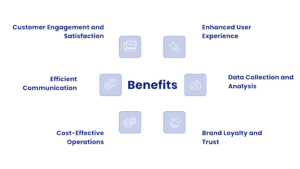
1. Customer Engagement and Satisfaction
Chatbots can provide personalized responses and recommendations based on customer preferences and history, making interactions more human-like. Moreover, businesses can offer round-the-clock support, addressing customer queries and concerns at any time, contributing to enhanced customer satisfaction.
2. Efficient Communication
WhatsApp chatbots enable businesses to respond to customer inquiries instantly, reducing wait times and improving overall communication efficiency. Businesses can also automate the delivery of important updates, promotions, and notifications, keeping customers informed without manual efforts.
3. Cost-Effective Operations
Chatbots can handle routine queries and tasks, freeing up human resources to focus on more complex and value-added activities, leading to cost savings. As the business grows, chatbots can easily scale to handle a larger volume of inquiries without proportional increases in costs.
4. Enhanced User Experience
Chatbots offer a conversational interface, making interactions more intuitive and enjoyable for users. WhatsApp chatbots can also process images, videos, and documents, allowing businesses to provide a richer and more engaging user experience.
5. Data Collection and Analysis
Chatbots can collect valuable customer data, preferences, and feedback, providing businesses with insights to improve products and services. Integration with analytics tools allows businesses to analyze customer interactions, helping them make informed decisions to enhance their offerings.
6. Brand Loyalty and Trust
Chatbots ensure consistent communication, maintaining a cohesive brand voice and reinforcing brand identity. Swift issue resolution through chatbots contributes to customer trust and loyalty.
By incorporating a WhatsApp chatbot into your business operations, you can humanize digital interactions, providing a seamless and efficient experience for customers while optimizing internal processes.
Also read – WhatsApp Marketing: The Ultimate Guide for Businesses
Types of WhatsApp chatbots
Once you’ve identified your business objectives, it’s time to consider the kind of chatbot that would be most effective in assisting with that goal. Think about the chatbot as a helpful companion tailored to meet your specific business needs, aiming to bring a warm and human touch to the interaction. Consider the characteristics and features that align with your goal, creating an experience that feels not only efficient but also friendly and engaging for users.
Rule-based chatbots
Rule-based WhatsApp chatbots are the fundamental building blocks of automated conversations. Created swiftly and easily, they provide a user-friendly experience through interactive options like buttons or simple text replies (e.g., ‘A’ or ‘B’). While their simplicity is a key feature, their utility is substantial.
Key Characteristics:
Interactive Choices: Users are presented with predefined options, enabling them to navigate the conversation effortlessly.
Efficient Resolution: Designed for quick problem-solving, these chatbots address straightforward queries promptly, saving users from prolonged wait times and liberating human agents for more intricate issues.
User-Friendly Interface: The intuitive nature of rule-based chatbots ensures a seamless interaction, making them accessible even to those unfamiliar with advanced technologies.
Time and Resource Savings: By automating routine queries, these chatbots enhance operational efficiency, reducing customer wait times and allowing human agents to focus on tasks that require nuanced understanding.
Use Cases:
FAQs and Information Retrieval: Perfect for handling frequently asked questions, users can easily obtain information without the need for human intervention.
Appointment Scheduling: Rule-based chatbots excel in setting up appointments or reservations, simplifying the process for users.
Order Tracking: Efficiently track and provide updates on orders, keeping customers informed without manual intervention.
Intent-based or AI-powered WhatsApp Chatbots
Intent-based WhatsApp chatbots represent a more sophisticated approach, harnessing the power of Natural Language Processing (NLP) to decipher user intent. Unlike rule-based bots, they comprehend the varied expressions users might employ to convey the same meaning, striving to emulate human-like conversations.
Key Characteristics:
Natural Language Understanding: These bots analyze user messages, identifying underlying intents rather than relying on predefined options. Variations in language and phrasing are effortlessly interpreted.
Conversational Depth: Intent-based chatbots engage users in a manner akin to human interaction, fostering a more dynamic and personalized conversational experience.
Varied Query Recognition: Users can pose queries in diverse ways, and the chatbot, leveraging its understanding of intent, provides coherent and accurate responses.
Continuous Learning: With access to ample data, these chatbots continually refine their understanding, becoming more adept at recognizing and responding to user intents over time.
Use Cases:
Personalized Recommendations: Intent-based chatbots excel in understanding user preferences, and delivering tailored recommendations for products, services, or content.
Complex Query Resolution: Users can pose intricate questions or requests, and the chatbot, equipped with NLP, navigates through the complexity to provide comprehensive answers.
Language Variance Handling: Accommodating different phrasings of queries, these chatbots ensure a seamless conversation, regardless of the linguistic nuances employed by users.
WhatsApp Chatbot Real-world Applications
WhatsApp chatbots have gained popularity in the business world due to their ability to streamline communication, automate tasks, and enhance customer engagement. Here are some real-world applications of WhatsApp chatbots for businesses:
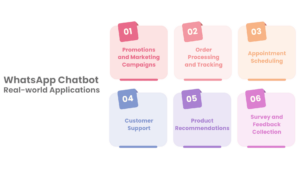
Promotions and Marketing Campaigns
WhatsApp chatbots can be employed for marketing purposes, delivering promotional messages, discount codes, and special offers directly to customers. Businesses can use chatbots to run interactive WhatsApp marketing campaigns, such as quizzes, contests, or surveys, to engage customers.
Order Processing and Tracking
Businesses can integrate WhatsApp chatbots into their ordering and delivery processes. Customers can place orders, track shipments, and receive order updates through the chatbot. Chatbots can provide order confirmation, delivery status, and even handle returns or exchanges.
Appointment Scheduling
Service-oriented businesses, such as clinics, salons, or consultants, can use WhatsApp chatbots to facilitate appointment scheduling. Customers can check availability, book appointments, and receive reminders through the chatbot.
Customer Support
Businesses can deploy WhatsApp chatbots to provide instant and automated customer support. Chatbots can handle common queries, provide information about products or services, and offer troubleshooting assistance. Chatbots can guide users through step-by-step processes, helping them resolve issues without the need for human intervention.
Product Recommendations
E-commerce businesses can leverage chatbots to offer personalized product recommendations based on customer preferences, purchase history, and browsing behavior. Chatbots can assist users in finding the right products and provide information on discounts or promotions.
Survey and Feedback Collection
WhatsApp chatbots can be used to conduct surveys and collect feedback from customers. Businesses can gather valuable insights, measure customer satisfaction, and identify areas for improvement. Automated feedback collection through chatbots helps businesses stay connected with their customers and make data-driven decisions.
By implementing WhatsApp chatbots in these ways, businesses can enhance efficiency, improve customer satisfaction, and stay competitive in the digital landscape. The key is to tailor the chatbot’s functionalities to meet the specific needs and goals of the business.
WhatsApp Chatbot Best Practices
Implementing WhatsApp chatbots for business comes with its own set of best practices to ensure a seamless and effective interaction with customers. Here are some best practices to consider:
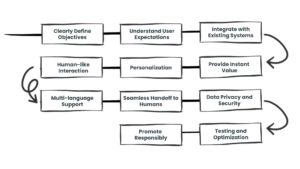
Clearly Define Objectives
Clearly define the goals and objectives of implementing a WhatsApp chatbot. Whether it’s improving customer support, increasing sales, or streamlining processes, having a clear purpose will guide the design and functionality of the chatbot.
Understand User Expectations
Understand your audience and their expectations. Identify common user queries and pain points to design the chatbot in a way that addresses these issues effectively.
Provide Instant Value
Ensure that the chatbot provides instant value to users. Users should be able to quickly find information, get assistance, or complete tasks without unnecessary delays.
Personalization
Personalize interactions based on user preferences, behaviors, and past interactions. This helps in creating a more engaging and tailored experience, enhancing customer satisfaction.
Human-like Interaction
Design the chatbot to have a conversational and human-like tone. Avoid sounding overly robotic and consider incorporating humor or empathy when appropriate. This helps in building a more natural and pleasant interaction.
Multi-language Support
If your business operates in diverse regions, consider incorporating multi-language support in your chatbot. This ensures that users can communicate in their preferred language, breaking down language barriers.
Seamless Handoff to Humans
Design the chatbot to seamlessly hand off conversations to human agents when needed. While chatbots can handle many queries, there are situations where human intervention is necessary, such as complex issues or escalated customer complaints.
Data Privacy and Security
Prioritize data privacy and security. Clearly communicate how user data is handled, stored, and used. Ensure compliance with data protection regulations to build trust with users.
Testing and Optimization
Test the chatbot extensively before launch to identify and address any issues. Collect user feedback and use analytics to continuously optimize the chatbot for better performance and user satisfaction.
Promote Responsibly
If you’re using the chatbot for marketing or promotional purposes, do so responsibly. Avoid spammy behavior and ensure that messages are relevant and valuable to the user.
Integrate with Existing Systems
Integrate the chatbot with existing business systems, such as CRM or e-commerce platforms, to provide a seamless experience for both users and internal teams.
By following these best practices, businesses can maximize the effectiveness of their WhatsApp chatbots, deliver a positive user experience, and achieve their desired business outcomes.
Let our team guide you about the best practices. Talk to us
To Conclude
The advent of WhatsApp chatbots has ushered in a new era of communication for businesses, offering a myriad of benefits and innovative features. These sophisticated tools, whether rule-based or powered by artificial intelligence, have become integral to modern customer engagement strategies.
The diverse features and capabilities of WhatsApp chatbots, including personalization, rich media content support, multilingual capabilities, and CRM integration, make them a versatile solution for businesses seeking efficient and interactive communication channels. These features contribute to improved customer engagement, streamlined communication, and enriched user experiences.
Implementing WhatsApp chatbots brings forth a lot of benefits for businesses. From personalized interaction and efficient communication to cost-effective operations and enhanced user experiences, these chatbots play a pivotal role in building brand loyalty and trust. The data collected through chatbots also provides valuable insights for informed decision-making.
In essence, WhatsApp chatbots represent a powerful tool for businesses to humanize digital interactions, optimize internal processes, and stay competitive in the ever-evolving landscape of modern communication. As technology continues to advance, the role of WhatsApp chatbots is likely to evolve, offering even more sophisticated solutions for businesses aiming to excel in customer engagement and communication.
Get in touch with our WhatsApp Chatbot Experts.

